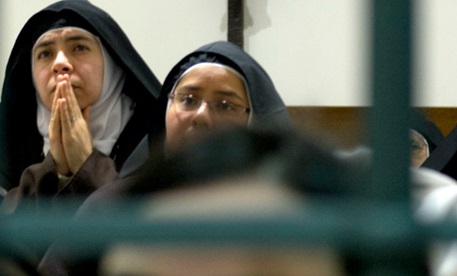A breakthrough court ruling has found Argentinian archbishop Mario Cargnello and three Catholic officials guilty of gender abuse.
All four must undergo psychological treatment and training in gender discrimination, Judge Carolina Cáceres decreed.
Cáceres’s breakthrough ruling found the accused had abused 20 cloistered of Discalced Carmelite nuns for over twenty years.
Although the archbishop and officials denied committing any violence, Cáceres saw their actions differently.
A group of the nuns had brought the case against the men to court.
The nuns cited a range of mistreatment. This included verbal insults, threats, humiliation and physical — although not sexual — assault.
They had told the court of instances of Cargnello grabbing, slapping and shaking women.
In one case, they said Cargnello squeezed a nun’s lips to silence her. In another case, he pounced on a nun, striking her as he struggled to snatch a camera from her hands.
They also accused Cargello of borrowing their money without paying them back.
The judge described the instances as “physical and psychological gender violence”.
“I conclude and affirm that the nuns have suffered acts of gender violence religiously, physically, psychologically and economically for more than 20 years” she said.
She ordered the verdict be conveyed to Pope Francis, himself an Argentinian.
Longstanding abuse
The Argentinian judge’s ruling casts a spotlight on Catholic priests’ and bishops’ long-standing abuse of nuns.
The nuns’ lawyer hailed the verdict as unprecedented in Argentina. It recognises the plaintiffs’ plight and the deeper problem of gender discrimination.
“It shatters the ‘status quo’ because it targets a person with a great deal of power” the nuns’ lawyer says.
While other church scandals generally take centre stage, gender abuse cases are not isolated.
Bringing such cases into the open is attributed to nuns feeling emboldened by the #MeToo movement and its Church corollary, #NunsToo.
Appeal likely
The archbishop’s lawyer claims the ruling is baseless and is planning to appeal.
Nonetheless, the archbishop will abide by the order to receive treatment and anti-discrimination training through a local NGO, his lawyer says.
He will do it “whether or not he agrees with its basis”.
Hidden problem
In recent years, several prominent cases have emerged involving nuns, laywomen and consecrated women denouncing priests for their spiritual, psychological, physical or sexual abuse.
Their complaints have been largely unheard.
The Vatican has been deaf. Argentina’s rigid all-male clerical hierarchy didn’t seem to offer an option.
The nuns turned instead to the secular justice system.
A similar dynamic occurred when the clergy abuse of minors scandal first erupted decades ago. Then, as now, victims turned to secular courts because of inaction by church authorities.
Source
